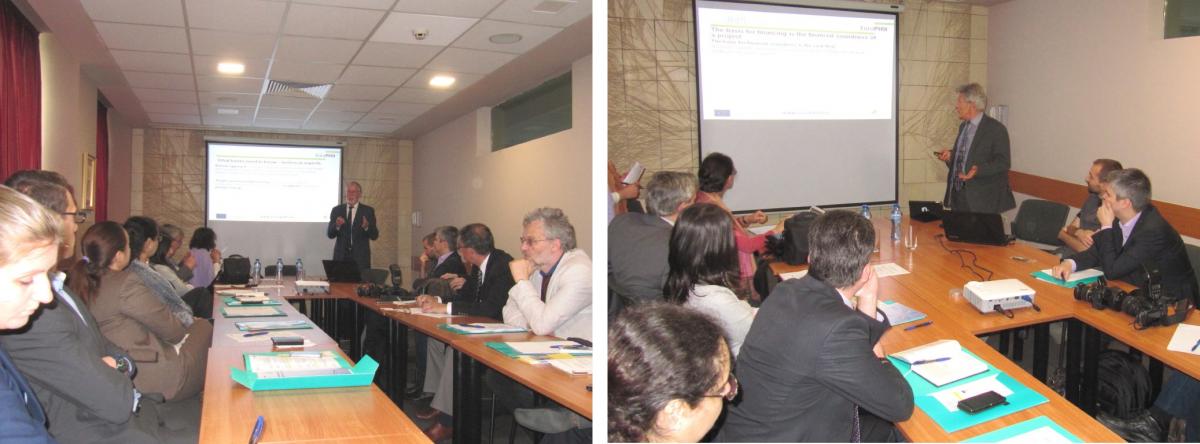- Home
- Energy Retrofits
- Projects
- Finance
- Financial workshops
- 1st Financial workshop - London, UK
- 2nd Financial workshop - Bratislava, SK
- 3rd Financial workshop - Copenhagen, DK
- 4th Financial workshop - Dublin, IE
- 5th Financial Workshop - Milan, IT
- 6th Financial Workshop - Leipzig, DE
- 7th Financial Workshop - Sofia, BG
- 8th Financial Workshp - Sophia, BG
- 9th Financial Workshop - Växjö, SE
- 10th Financial Workshop - Barcelona, ES
- 11th Financial Workshop - Barcelona, ES
- 12th Financial Workshop in Paris, France
- Final Financial Workshop
- Questionnaires
- Financial workshops
- Products
- Events/Awards
- Downloads
7th Financial Workshop - Sofia, BG
Seventh workshop held to explore the financing of energy efficient step-by-step retrofits
Date: 28th May 2015
Location: hotel Hemus, Sofia, Bulgaria
Participants: 27 bankers from all banks in BG were personally invited from the Executive Director of EnEffect, 17 confirmed their attendance. There were 23 people participating in the seminar, 7 from them as lectors.
The official programme and invitation can be downloaded here (in Bulgarian).
 Georg Kraft (left) and Klaus Stocker (right) are presenting at 7th Financial workshop in Sophia, Bulgaria; Photos © IzN
Georg Kraft (left) and Klaus Stocker (right) are presenting at 7th Financial workshop in Sophia, Bulgaria; Photos © IzN
Summary:
- Welcome address and introduction by Zdravko Genchev, Executive Director of EnEffect. After presenting the other speakers, he outlined the present situation on adoption of the European Directives (EE & EPBD) and shared the conclusion that most of the countries fail in their efforts for reducing Primary energy consumption. He introduced the topics of Nearly Zero Energy Buildings, energy efficient retrofits and EuroPHit project. He gave examples with PH buildings and retrofits.
- Iglika Lutzkanova from EnEffect explained in detail the EuroPHit project and the concept of step-by-step retrofit. She tried to convince the auditorium that PH standard is achievable and needed in Bulgaria. She explained the necessity of ventilation as a means to provide the necessary levels of comfort. She presented the Case study “St.St. Cyril and Methodius” in Gabrovo and the steps that need to be taken.
- Georg Kraft presented the topic “Guidelines for Financial Institutions”. He explained what banks need to consider the entire building and not just a part of it; to target values for primary energy, to accept reliable calculation tools and certification systems. He also gave examples with the promotional schemes used by KfW.
- Klaus Stoker presented “Cash flow analysis as basis for financing”. He discussed financial instruments for energy efficiency investments in buildings like debt financing, ESCO financing, forfaiting, and leasing.
The discussions continued during the café break.
- Pavel Manchev from EnEffect presented the financial aspects of the selection of measures in energy efficiency projects. He presented the financial analysis of the “St.St. Cyril and Methodius school”, a part of which is an investment plan, in which each step is performed at the moment that it becomes profitable because of the rise of the fuel prices and reduced cost of the products used. For the assessment of the profitability of the steps, a moment when the internal rate of return (IRR) is higher than 10% for a given 20-year period is selected, but it is mandatory that this moment is chosen when the time for repair of the building is approaching (eg. Change of windows place after the expiry of their economic life in '25). He made comparison with “one shot” variant, and variants with different energy sources.
- Krasimir Najdenov - Director of Direction Coordination and management of EE & RES at the Sustainable Energy Development Agency (SEDA) presented the introduction of the White certificates in Bulgaria – an area, new for the country. He made introduction of energy trading schemes and 'white' certificates – what they are and how they will be used. “White certificate” is a document, which declares the amount of energy savings. They can be traded on the stock exchange. Energy service companies sell them. White certificates are promoting investments without a budget. So far 18 states have introduced or plan to introduce them. Mr. Najdenov emphasized on the motivation of the users and the expected results. In his presentation he pointed out the new role of energy distributors and suppliers: the energy service offered must include, besides the energy supply as such, also measures and services for the effective use of the supplied energy. Therefore, energy suppliers must also know and offer a range of possible energy saving measures.
- Dimitar Doukov- Director of the Bulgarian Energy Efficiency and Renewable Sources Fund (BGEEF) made presentation on Opportunities and Barriers to Financing EE Retrofits. He summarized the barriers and gave recommendations to overcome them. As a good example he pointed out the creation of a National Fund for energy efficiency financing and technical support, under the Directive 2012/27 / EC - Art. 20. He presented the work of BGEEF, which gives credits below market interest rates, partial credit guarantees and portfolio guarantees. He explained the schemes used by the Fund and showed examples of the completed projects, financed by it.
You can download presentations from Financial workshops or browse other downloadable EuroPHit materials here.

